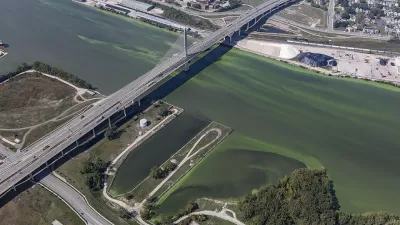Toledo, Ohio held a special election for voters to decide on the Lake Erie Bill of Rights.

As Planetizen previewed late last week, voters considered the Lake Erie Bill of Rights this week, which proposed the legal status of personhood for the environmentally troubled lake.
Voters overwhelmingly approved the idea, according to an article by Tom Henry: "In a special election that drew only about 9 percent of Toledo’s registered voters to the polls, the citizen-led Lake Erie Bill of Rights referendum passed by a 61-39 margin on Tuesday night, according to unofficial election results."
"Toledo represents only a fraction of the entire Lake Erie basin, but it lies along the heart of the western Lake Erie shoreline — the most ecologically fragile and most biologically dynamic part of the Great Lakes basin because of its shallowness and relative warmth. Just outside the Toledo area lies some of North America’s top fishing and birding opportunities," explains Henry of the city of Toledo's stake in the debate.
The approval of the Lake Erie Bill of Rights doesn't entirely resolve the issue, however. "Now, it’s up to lawyers to sort out what the citizenry’s impassioned plea for the lake really means in practice — that is, if it will be more of a symbolic gesture or, as its supporters claim, a new approach to planning and enforcement that will hold more polluters accountable," according to Henry.
An article published by WTVG proves that point, reporting that the Drewes Family Farm in Custar filed the first lawsuit against the Lake Erie Bill of Right in U.S. District Court. "The suit says the Lake Erie Bill of Rights puts the Drewes Family at risk of massive liability if any fertilizer runoff enters the Lake Erie watershed," according to the article.
Additional commentary and insight into the Lake Erie Bill of Rights is available in an article on Vox by Sigal Samuel. The article includes a lot of historical background on the evolving legal question of the rights of nature. Samuel also speculates on the potential effectiveness of this strategy.
FULL STORY: Lake Erie Bill of Rights gets approval from Toledo voters

Trump Administration Could Effectively End Housing Voucher Program
Federal officials are eyeing major cuts to the Section 8 program that helps millions of low-income households pay rent.

Planetizen Federal Action Tracker
A weekly monitor of how Trump’s orders and actions are impacting planners and planning in America.

Ken Jennings Launches Transit Web Series
The Jeopardy champ wants you to ride public transit.

Washington Legislature Passes Rent Increase Cap
A bill that caps rent increases at 7 percent plus inflation is headed to the governor’s desk.

From Planning to Action: How LA County Is Rethinking Climate Resilience
Chief Sustainability Officer Rita Kampalath outlines the County’s shift from planning to implementation in its climate resilience efforts, emphasizing cross-departmental coordination, updated recovery strategies, and the need for flexible funding.

New Mexico Aging Department Commits to Helping Seniors Age ‘In Place’ and ‘Autonomously’ in New Draft Plan
As New Mexico’s population of seniors continues to grow, the state’s aging department is proposing expanded initiatives to help seniors maintain their autonomy while also supporting family caregivers.
Urban Design for Planners 1: Software Tools
This six-course series explores essential urban design concepts using open source software and equips planners with the tools they need to participate fully in the urban design process.
Planning for Universal Design
Learn the tools for implementing Universal Design in planning regulations.
Heyer Gruel & Associates PA
Ada County Highway District
Institute for Housing and Urban Development Studies (IHS)
City of Grandview
Harvard GSD Executive Education
Toledo-Lucas County Plan Commissions
Salt Lake City
NYU Wagner Graduate School of Public Service



























